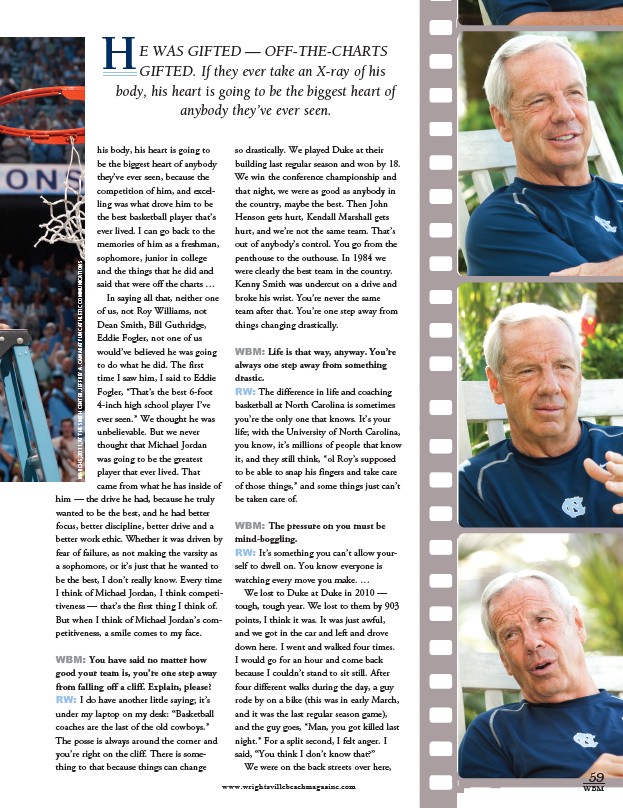
his body, his heart is going to
be the biggest heart of anybody
they’ve ever seen, because the
competition of him, and excel-ling
was what drove him to be
the best basketball player that’s
ever lived. I can go back to the
memories of him as a freshman,
sophomore, junior in college
and the things that he did and
said that were off the charts …
In saying all that, neither one
of us, not Roy Williams, not
Dean Smith, Bill Guthridge,
Eddie Fogler, not one of us
would’ve believed he was going
to do what he did. The first
time I saw him, I said to Eddie
Fogler, “That’s the best 6-foot
4-inch high school player I’ve
ever seen.” We thought he was
unbelievable. But we never
thought that Michael Jordan
was going to be the greatest
player that ever lived. That
came from what he has inside of
him — the drive he had, because he truly
wanted to be the best, and he had better
focus, better discipline, better drive and a
better work ethic. Whether it was driven by
fear of failure, as not making the varsity as
a sophomore, or it’s just that he wanted to
be the best, I don’t really know. Every time
I think of Michael Jordan, I think competi-tiveness
— that’s the first thing I think of.
But when I think of Michael Jordan’s com-petitiveness,
a smile comes to my face.
WBM: You have said no matter how
good your team is, you’re one step away
from falling off a cliff. Explain, please?
RW: I do have another little saying; it’s
under my laptop on my desk: “Basketball
coaches are the last of the old cowboys.”
The posse is always around the corner and
you’re right on the cliff. There is some-thing
to that because things can change
so drastically. We played Duke at their
building last regular season and won by 18.
We win the conference championship and
that night, we were as good as anybody in
the country, maybe the best. Then John
Henson gets hurt, Kendall Marshall gets
hurt, and we’re not the same team. That’s
out of anybody’s control. You go from the
penthouse to the outhouse. In 1984 we
were clearly the best team in the country.
Kenny Smith was undercut on a drive and
broke his wrist. You’re never the same
team after that. You’re one step away from
things changing drastically.
WBM: Life is that way, anyway. You’re
always one step away from something
drastic.
RW: The difference in life and coaching
basketball at North Carolina is sometimes
you’re the only one that knows. It’s your
life; with the University of North Carolina,
you know, it’s millions of people that know
it, and they still think, “ol Roy’s supposed
to be able to snap his fingers and take care
of those things,” and some things just can’t
be taken care of.
WBM: The pressure on you must be
mind-boggling.
RW: It’s something you can’t allow your-self
to dwell on. You know everyone is
watching every move you make. …
We lost to Duke at Duke in 2010 —
tough, tough year. We lost to them by 903
points, I think it was. It was just awful,
and we got in the car and left and drove
down here. I went and walked four times.
I would go for an hour and come back
because I couldn’t stand to sit still. After
four different walks during the day, a guy
rode by on a bike (this was in early March,
and it was the last regular season game),
and the guy goes, “Man, you got killed last
night.” For a split second, I felt anger. I
said, “You think I don’t know that?”
We were on the back streets over here,
March 5, 2011, at the Smith Center. Jeffrey A. Camarati/UNC Athletic communications
e was gifted — off-the-charts
gifted. If they ever take an X-ray of his
body, his heart is going to be the biggest heart of
anybody they’ve ever seen.
H
59
www.wrightsvillebeachmagazine.com WBM